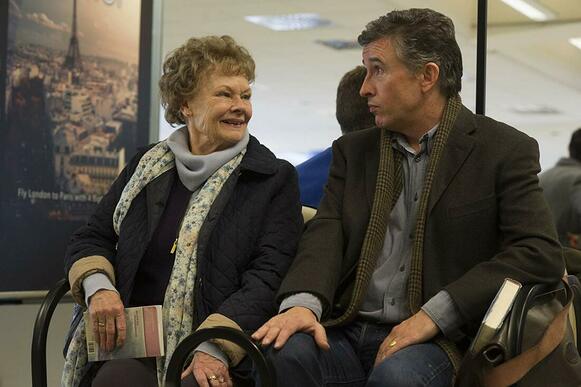PHILOMENA
****
Director: Stephen Frears
Screenwriters: Steve Coogan and Jeff Pope
Principal cast:
Judi Dench
Steve Coogan
Mare Cunningham
Sophie Kennedy Clark
Country: UK
Classification: M
Runtime: 98 mins.
Australian release date: 26 December 2013
Previewed at: Sony Pictures Theatrette, Sydney on 22 October 2013
In an inspirational tale of an ‘odd couple’, Stephen Frears’s drama, Philomena, based on the book The Lost Child Of Philomena Lee by the ex-BBC journalist Martin Sixsmith, successfully manages “to walk a line between what is funny and tragic”. How apt is this quote by one of the screenwriters? Absolutely spot-on as it turns out. The story goes that British actor/comedian Steve Coogan, like Sixsmith, heard about the tragic plight of an Irish woman searching for her long-lost son and became enthralled by the story. She had been pining for her ‘stolen child’ for some 50 years and had lived with the guilt and shame of giving him up for adoption, albeit unwillingly.
In 1952, a very innocent and very young Philomena (initially played by Sophie Kennedy Clark) and, as an adult, by Judi Dench, had a one night stand, fell pregnant and ended up working in the laundry of a home for unwed mothers run by Roman Catholic nuns; her only joy was the one hour a day she was allowed to spend with her child. Meanwhile the nuns at the Roscrea Convent in Tipperary, Ireland, were scheming to sell-off the kids in their ‘care’ to Americans who could afford to adopt them. In a particularly heart-wrenching scene, Philomena witnesses her three-year-old son, Anthony, being taken away by his adoptive parents; she had not been told he had been selected for adoption so was totally unprepared for his loss. Thus, she spends the rest of her life wondering what happened to him until she eventually meets Sixsmith (Steve Coogan) and they set off on a road trip to the USA in search of Anthony.
The multi-talented Coogan co-wrote the screenplay (with Jeff Pope) and says the story is about “tolerance and understanding”, not just between the Catholic church and the young mothers it took advantage of, but also between the two central characters, who hold opposing views on religion and just about everything else. Philomena is a working-class, elderly Irish woman who sees life in a simple, but honest way. She never shunned her religious beliefs even though the nuns let her down and subjected her to a life of incomprehensible sadness; Sixsmith, on the other hand, is a middle-class, Oxford-educated intellectual who, apart from being a foreign correspondent for the BBC, was a former Director of Communications in the Blair Government. Philomena is down-to-earth, but Sixsmith is a cynic who is enraged by the Church’s hypocritical behaviour.
As referred to at the start of this review, the remarkable thing about Stephen Frears’s direction of Philomena is the light touch he has managed to bring to what is, in essence, a tragic tale of loss. He is aided in this, in no small measure, by the script (nominated for a Golden Globe award) and Coogan’s both serious and at times humorous depiction of Martin Sixsmith. Both Dench (another Golden Globe nomination for Best Actress) and Coogan deliver fine performances. Philomena may well garner Academy Award nominations in the same categories, too. If so, they would be well deserved for this is very probably the best British film of the year.
